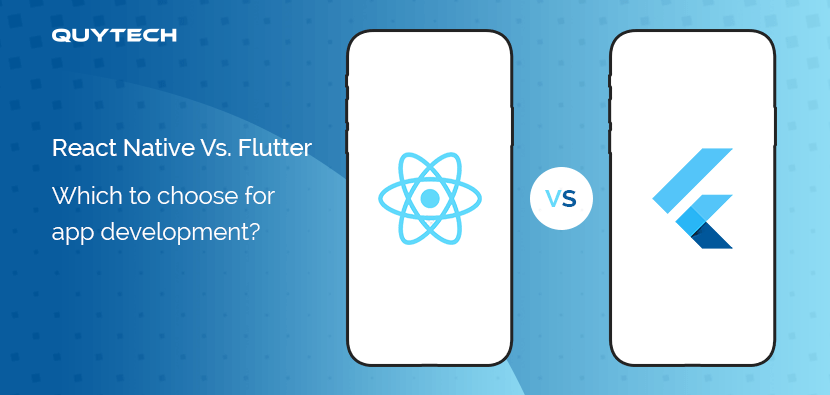With people using different types of devices (smartphones, tablets, iPhones, etc.), developing cross-platform applications has become a trendy business agenda for startups and enterprises. A cross-platform app is compatible with multiple operating systems and hence, can be accessed from any device. To develop such applications, there are two frameworks, Flutter and React Native, which are being preferred by the developers all across the world.
Now, if you too want a cross-platform mobile application for your business, then you must be thinking about the difference between these two or thinking that which among these two would be suitable for your app. Let’s check out the below-given points that show the comparison between React Native and Flutter framework.
Definition
- React Native- Officially released in 2015, React Native is an open-source mobile application framework that allows developers to use JS and React together with native platform abilities. This highly reliable framework comes up with many ready-made components to make the app development process effortless.
- Flutter- Initially released in 2017, Flutter is a well-recognized open-source framework that is used to develop cross-platform mobile apps. This free to use framework have hot reload functionality and is highly customizable.
Technical Architecture
- React Native- The architecture of this framework depends on the JS runtime environment, which is also recognized as the JS bridge. React Native uses Flux architecture provided by Facebook. Hire react native developers from a prominent company to get started with react native development services.
- Flutter- The Dart-based framework utilizes the Skia C++ engine, which includes required compositions, protocols, and channels.
Winner- Flutter has many built-in components and doesn’t require any bridge to communicate with the native components, whereas, React Native relies on the JS bridge for the same. This results in poor performance, so, the former is the winner.
Corporate backing
- React Native- React Native is developed and backed by Facebook; in fact, the company has also coded many of its internal products using this framework.
- Flutter- Flutter was released by Google in 2017. It’s an open-source SDK (Software Development Kit) that uses a single codebase for developing mobile apps for Android and iOS platforms.
Winner- Both React Native and Flutter has strong corporate backing.
Installation
- React Native- To install React Native, you need Node Package Manager. Developers with JavaScript background can install the framework without any hassle, but, others might have to learn NPM for the successful installation of React Native. This is required to know where exactly the binary code is located.
- Flutter- To install this framework, a developer can download a binary source platform from Github. And those who want to install it on macOS have to download flutter.zip file and then use a path variable.
Winner- React Native (as it can be installed just by NPM)
Programming Language
- React Native- JavaScript is the language that is popularly used with the React Native to build cross-platform apps. JS is a dynamically typed language and there is no dearth of developers holding expertise in the same. In other words, any developers with hands-on experience of working with JavaScript can learn React Native easily.
- Flutter- Flutter uses Dart to build applications. A developer, mainly from a C++ or Java background, needs to learn Dart to develop apps using this framework.
Winner- React Native (because of the learning curve involved in Flutter)
Performance
- React Native- React Native uses a JavaScript bridge to communicate with the native components, which affects its performance.
- Flutter- Flutter doesn’t require such a bridge as Dart code is compiled into native code, which increases the performance of this framework.
Winner- Flutter
Testing and Community Support
- React Native- React Native includes JS framework, which already has a few unit level testing tools such as Jest. On the other hand, it doesn’t include any tool for UI level testing. Released in 2015, this framework has great community support. Hire react native developers from Quytech to get started with react native development services.
- Flutter- Flutter comes up with a rich set of testing features for testing an app at three major levels: widget, integration, and unit. In the case of community support, Flutter is a bit behind the React Native.
Winner- Flutter is the clear winner in case of testing support. When talking about community support, React Native has a plus point over Flutter.
Release Automation Support
- React Native– React Native depends on third-party libraries to offer build and automation support.
- Flutter- Flutter comes up with a great automation tooling to deploy apps from the command line.
Winner- Flutter is an undisputed winner in the race of release automation support.
Read More: Kotlin Vs Flutter- Which to choose for Android Development?
Final Words
Both React Native and Flutter have their advantages and disadvantages. Some might be in favor of the former, whereas, others may vote for the latter. Choosing one among these depends on your specific app requirements and a few other factors. If you are a naïve and have little knowledge of mobile app development and these two frameworks, then connect to a mobile app development company or hire mobile app developers to develop your application using either React Native or Flutter. A professional and reliable app development company will also suggest to you that which framework would be best for your app development project
.

